基础语法知识
汉语基本知识 语法篇pdf
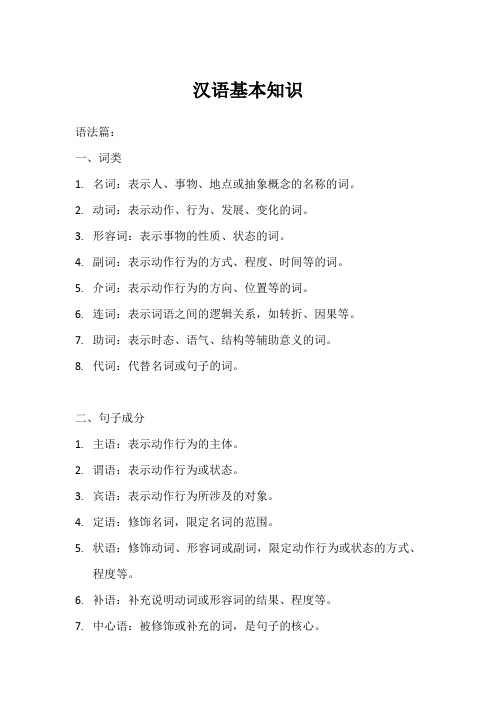
汉语基本知识语法篇:一、词类1.名词:表示人、事物、地点或抽象概念的名称的词。
2.动词:表示动作、行为、发展、变化的词。
3.形容词:表示事物的性质、状态的词。
4.副词:表示动作行为的方式、程度、时间等的词。
5.介词:表示动作行为的方向、位置等的词。
6.连词:表示词语之间的逻辑关系,如转折、因果等。
7.助词:表示时态、语气、结构等辅助意义的词。
8.代词:代替名词或句子的词。
二、句子成分1.主语:表示动作行为的主体。
2.谓语:表示动作行为或状态。
3.宾语:表示动作行为所涉及的对象。
4.定语:修饰名词,限定名词的范围。
5.状语:修饰动词、形容词或副词,限定动作行为或状态的方式、程度等。
6.补语:补充说明动词或形容词的结果、程度等。
7.中心语:被修饰或补充的词,是句子的核心。
三、句型1.主谓句:由主语和谓语组成的句子,是汉语中最基本的句型。
2.谓宾句:由谓语和宾语组成的句子,表示动作行为和对象的关系。
3.主谓定状补句:在主谓句的基础上,通过添加定语、状语和补语,进一步明确动作行为或状态的方式、程度等。
4.并列句:由两个或两个以上的分句组成,分句之间是并列关系,表示相关或相对的意思。
四、句式1.陈述句:表示陈述事实的句子,语调平缓。
2.疑问句:表示疑问或询问的句子,语调上扬。
3.祈使句:表示请求、命令或禁止的句子,语调短促有力。
4.感叹句:表示感叹、赞叹或惊奇的句子,语调有抑扬顿挫。
五、复句1.并列复句:由两个或两个以上的分句组成,分句之间是并列关系,表示相关或相对的意思。
2.转折复句:由两个分句组成,前一分句表示一个意思,后一分句表示与前一分句相反或相对的意思。
3.条件复句:由两个分句组成,前一分句表示条件,后一分句表示在该条件下所产生的结果。
4.递进复句:由两个分句组成,后一分句的意思比前一分句的意思更进一层。
5.选择复句:由两个或两个以上的分句组成,分句之间表示选择关系,即只能选择其中之一的意思。
六、修辞手法1.比喻:用具体的、浅显的事物来比喻抽象的、深奥的事物,使语言更加形象生动。
英语语法初中基础知识大全

英语语法初中基础知识大全一、词法(一)名词1. 名词的分类普通名词:如book(书)、tree(树)、student(学生)等。
可分为可数名词和不可数名词。
专有名词:表示特定的人、地方、组织、机构等名称,如China(中国)、Tom(汤姆)、the Great Wall(长城)等。
首字母一般大写。
2. 名词的数可数名词有单数和复数形式。
规则变化:一般在词尾加s,如cat cats,dog dogs。
以s,x,ch,sh 结尾的名词,加es,如bus buses,box boxes,watch watches,brush brushes。
以辅音字母+ y 结尾的名词,把y 改i 再加es,如city cities,factory factories;但以元音字母+ y 结尾的名词,直接加s,如boy boys,day days。
以 f 或fe 结尾的名词,把 f 或fe 改为v 再加es,如knife knives,wife wives;但也有一些直接加s,如roof roofs。
不规则变化:如man men,woman women,child children,foot feet,tooth teeth 等。
不可数名词没有复数形式,如water(水)、milk(牛奶)、bread(面包)等。
计量时要用“数词+ 量词+ of + 不可数名词”的结构,如 a glass of water(一杯水),two pieces of bread(两片面包)。
3. 名词的所有格’s 所有格:一般在名词后加’s,如Mary’s book(玛丽的书)。
以s 结尾的复数名词,直接加’,如the students’ desks(学生们的课桌)。
表示两人或多人共有某物时,只在最后一个名词后加’s;若分别拥有,则每个名词后都加’s,如Tom and Jim’s room(汤姆和吉姆共有的房间);Tom’s and Jim’s rooms(汤姆的房间和吉姆的房间)。
语文语法基础知识
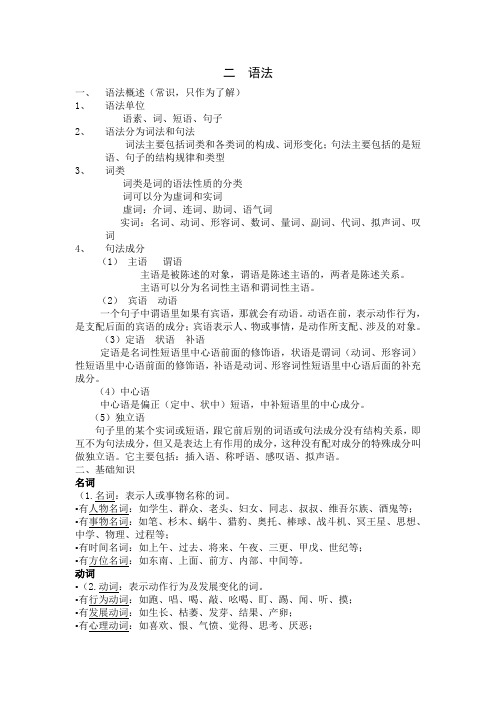
二语法一、语法概述(常识,只作为了解)1、语法单位语素、词、短语、句子2、语法分为词法和句法词法主要包括词类和各类词的构成、词形变化;句法主要包括的是短语、句子的结构规律和类型3、词类词类是词的语法性质的分类词可以分为虚词和实词虚词:介词、连词、助词、语气词实词:名词、动词、形容词、数词、量词、副词、代词、拟声词、叹词4、句法成分(1)主语谓语主语是被陈述的对象,谓语是陈述主语的,两者是陈述关系。
主语可以分为名词性主语和谓词性主语。
(2)宾语动语一个句子中谓语里如果有宾语,那就会有动语。
动语在前,表示动作行为,是支配后面的宾语的成分;宾语表示人、物或事情,是动作所支配、涉及的对象。
(3)定语状语补语定语是名词性短语里中心语前面的修饰语,状语是谓词(动词、形容词)性短语里中心语前面的修饰语,补语是动词、形容词性短语里中心语后面的补充成分。
(4)中心语中心语是偏正(定中、状中)短语,中补短语里的中心成分。
(5)独立语句子里的某个实词或短语,跟它前后别的词语或句法成分没有结构关系,即互不为句法成分,但又是表达上有作用的成分,这种没有配对成分的特殊成分叫做独立语。
它主要包括:插入语、称呼语、感叹语、拟声语。
二、基础知识名词(1.名词:表示人或事物名称的词。
•有人物名词:如学生、群众、老头、妇女、同志、叔叔、维吾尔族、酒鬼等;•有事物名词:如笔、杉木、蜗牛、猎豹、奥托、棒球、战斗机、冥王星、思想、中学、物理、过程等;•有时间名词:如上午、过去、将来、午夜、三更、甲戊、世纪等;•有方位名词:如东南、上面、前方、内部、中间等。
动词•(2.动词:表示动作行为及发展变化的词。
•有行为动词:如跑、唱、喝、敲、吆喝、盯、踢、闻、听、摸;•有发展动词:如生长、枯萎、发芽、结果、产卵;•有心理动词:如喜欢、恨、气愤、觉得、思考、厌恶;•有存现动词:如消失、显现、有、丢失、幻灭;有使令动词:如使、让、令、禁止、勒令;•有能愿动词:如会、愿意、可以、能够、宁可;有趋向动词:如来、去、上、下;•有判断动词:如是、为、乃。
英语语法基础知识大全
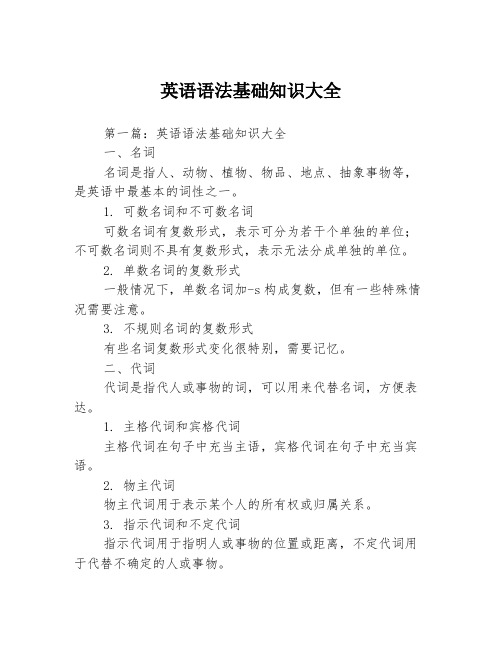
英语语法基础知识大全第一篇:英语语法基础知识大全一、名词名词是指人、动物、植物、物品、地点、抽象事物等,是英语中最基本的词性之一。
1. 可数名词和不可数名词可数名词有复数形式,表示可分为若干个单独的单位;不可数名词则不具有复数形式,表示无法分成单独的单位。
2. 单数名词的复数形式一般情况下,单数名词加-s构成复数,但有一些特殊情况需要注意。
3. 不规则名词的复数形式有些名词复数形式变化很特别,需要记忆。
二、代词代词是指代人或事物的词,可以用来代替名词,方便表达。
1. 主格代词和宾格代词主格代词在句子中充当主语,宾格代词在句子中充当宾语。
2. 物主代词物主代词用于表示某个人的所有权或归属关系。
3. 指示代词和不定代词指示代词用于指明人或事物的位置或距离,不定代词用于代替不确定的人或事物。
三、形容词和副词形容词是用来描述或限定名词的词,副词则是用来修饰动词、形容词或其他副词的词。
1. 形容词的用法和比较级形容词可以用来修饰名词并表示其性质、状态或特征,还可以用来进行比较。
2. 副词的用法和比较级副词用于修饰动词、形容词或其他副词,可以表示程度、时间、地点或方式等。
四、动词和时态动词是指表示动作、状态或存在的词。
时态是指动词所表示的时间。
1. 动词的时态和语态时态有现在时、过去时和将来时等,语态有主动语态和被动语态。
2. 动词的不定式和动名词不定式和动名词分别用于表示动作的目的或方式,还可以用作某些句子的主语或宾语。
五、介词和连词介词用于表示名词或代词与其他词的关系,连词则用于连接不同的句子或单词。
1. 常见介词常见的介词有at、in、on和to等,根据上下文不同使用不同的介词。
2. 连词的分类和用法连接词可以分为并列连词、从属连词和关系连词,用于连接不同的句子或单词。
六、形式和时态语法中的形式和时态常常会影响整个句子的结构和含义。
1. 形式的不同语法中的形式包括词性、时态、语态、人称和数等,可以根据不同的情况进行转换。
十大英语语法基础知识点归纳总结
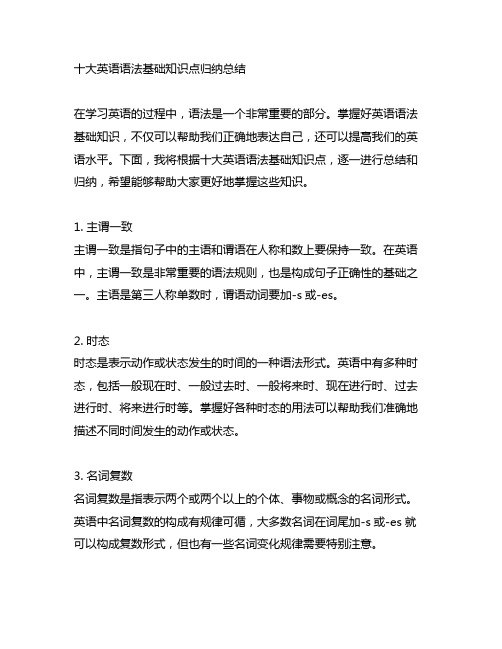
十大英语语法基础知识点归纳总结在学习英语的过程中,语法是一个非常重要的部分。
掌握好英语语法基础知识,不仅可以帮助我们正确地表达自己,还可以提高我们的英语水平。
下面,我将根据十大英语语法基础知识点,逐一进行总结和归纳,希望能够帮助大家更好地掌握这些知识。
1. 主谓一致主谓一致是指句子中的主语和谓语在人称和数上要保持一致。
在英语中,主谓一致是非常重要的语法规则,也是构成句子正确性的基础之一。
主语是第三人称单数时,谓语动词要加-s或-es。
2. 时态时态是表示动作或状态发生的时间的一种语法形式。
英语中有多种时态,包括一般现在时、一般过去时、一般将来时、现在进行时、过去进行时、将来进行时等。
掌握好各种时态的用法可以帮助我们准确地描述不同时间发生的动作或状态。
3. 名词复数名词复数是指表示两个或两个以上的个体、事物或概念的名词形式。
英语中名词复数的构成有规律可循,大多数名词在词尾加-s或-es就可以构成复数形式,但也有一些名词变化规律需要特别注意。
4. 冠词冠词是英语中用来限定名词的一种词类,包括定冠词“the”和不定冠词“a/an”。
冠词在句子中起着非常重要的限定作用,正确使用冠词可以让句子更加准确地表达出原意。
5. 代词代词是代替名词或名词词组的词语,用来避免重复或简化表达。
英语中的代词分为人称代词、物主代词、反身代词、指示代词、疑问代词、不定代词等多种类型,每种类型的代词都有着不同的用法和形式。
6. 动词时态和语态动词时态和语态是用来表示动作发生的时间和句子主语与谓语之间的关系。
英语中的动词时态包括一般现在时、一般过去时、一般将来时、现在进行时、过去进行时、将来进行时等,而语态则包括主动语态和被动语态。
7. 副词副词是用来修饰动词、形容词、副词或句子的成分,表示时间、地点、方式、原因、程度等。
在句子中,副词起着非常重要的修饰作用,可以让句子的表达更加生动和准确。
8. 介词介词是用来表示名词与其它词之间关系的一种虚词,包括表示时间、地点、方位、原因、目的等多种类型。
英语语法基础知识大全,全部整理好一定要收藏起来
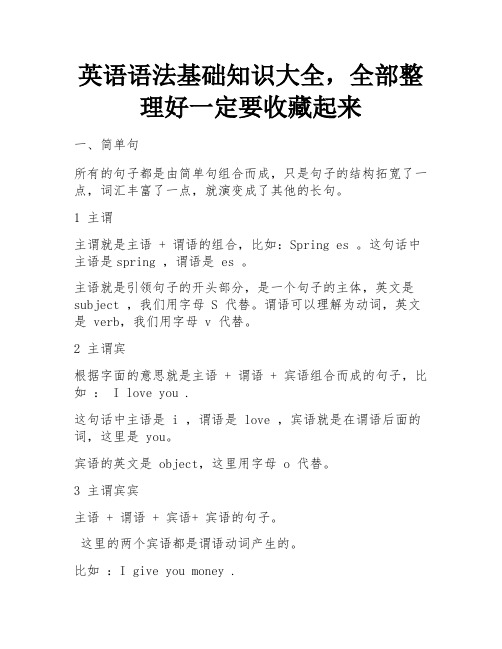
英语语法基础知识大全,全部整理好一定要收藏起来一、简单句所有的句子都是由简单句组合而成,只是句子的结构拓宽了一点,词汇丰富了一点,就演变成了其他的长句。
1 主谓主谓就是主语 + 谓语的组合,比如:Spring es 。
这句话中主语是spring ,谓语是 es 。
主语就是引领句子的开头部分,是一个句子的主体,英文是subject ,我们用字母 S 代替。
谓语可以理解为动词,英文是 verb,我们用字母 v 代替。
2 主谓宾根据字面的意思就是主语 + 谓语 + 宾语组合而成的句子,比如: I love you .这句话中主语是 i ,谓语是 love ,宾语就是在谓语后面的词,这里是 you。
宾语的英文是 object,这里用字母 o 代替。
3 主谓宾宾主语 + 谓语 + 宾语+ 宾语的句子。
这里的两个宾语都是谓语动词产生的。
比如:I give you money .这里的 you 和 money 都是 give 的宾语,give you 和 give money ,所以都是两个宾语。
4 主谓宾宾补主语 + 谓语 + 宾语+ 宾补的句子。
比如:It makes me happy .这里的 me 是 make 的宾语,但是 happy 不是 make 的宾语。
happy 是 me 的形容词,是一个宾补,全称为宾语补足语,起到了补充说明的作用。
注意:区分主谓宾宾和主谓宾宾补主谓宾中的两个宾语都是谓语产生的动作词,而主谓宾补语是宾语的形容词,与谓语无关。
5 主系表这里,系统代表系动词。
包含三个类别A be 动词: am is are was wereB 感官动词(五官)look 看起来sound 听起来smell 闻起来taste 尝起来feel 摸着....感觉......C 变化动词bee / turn / go / get / grow这里的表是代表表语,包括名词、形容词、介宾短语、不定式todo比如 you are beautiful 这句话中,you 是主语,are 是系动词,beautiful 是表语。
英语语法基础知识大全
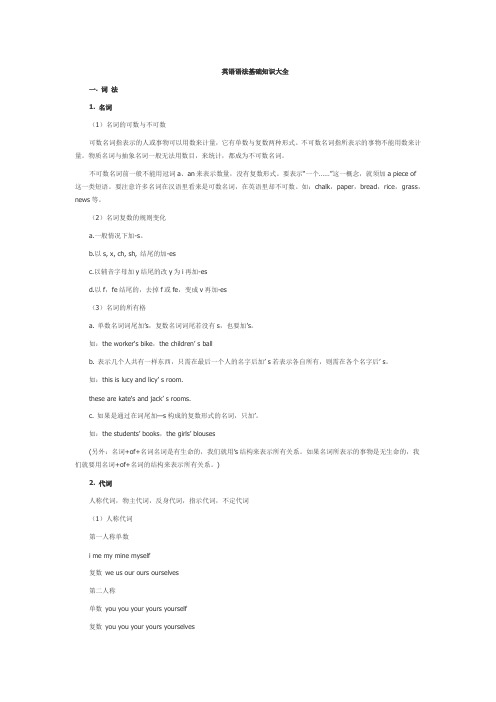
英语语法基础知识大全一. 词法1. 名词(1)名词的可数与不可数可数名词指表示的人或事物可以用数来计量,它有单数与复数两种形式。
不可数名词指所表示的事物不能用数来计量。
物质名词与抽象名词一般无法用数目,来统计,都成为不可数名词。
不可数名词前一般不能用冠词a、an来表示数量,没有复数形式。
要表示“一个……”这一概念,就须加a piece of这一类短语。
要注意许多名词在汉语里看来是可数名词,在英语里却不可数。
如:chalk,paper,bread,rice,grass,news等。
(2)名词复数的规则变化a.一般情况下加-s。
b.以s, x, ch, sh, 结尾的加-esc.以辅音字母加y结尾的改y为i再加-esd.以f,fe结尾的,去掉f或fe,变成v再加-es(3)名词的所有格a. 单数名词词尾加’s,复数名词词尾若没有s,也要加’s。
如:the worker‘s bike,the children’ s ballb. 表示几个人共有一样东西,只需在最后一个人的名字后加’ s若表示各自所有,则需在各个名字后’ s。
如:this is lucy and licy’ s room.these are kate‘s and jack’ s rooms.c. 如果是通过在词尾加—s构成的复数形式的名词,只加’。
如:the students’ books,the girls’ blouses(另外:名词+of+名词名词是有生命的,我们就用’s结构来表示所有关系。
如果名词所表示的事物是无生命的,我们就要用名词+of+名词的结构来表示所有关系。
)2. 代词人称代词,物主代词,反身代词,指示代词,不定代词(1)人称代词第一人称单数i me my mine myself复数 we us our ours ourselves第二人称单数you you your yours yourself复数you you your yours yourselves第三人称单数he him his his himselfshe her her hers herselfit it its its itself复数they them their theirs themselves(2)物主代词物主代词的用法:形容词性物主代词后面一定要跟上一个名词;名词性物主代词可作主语、表语、宾语。
汉语语法基础知识(完整版)精选全文完整版

可编辑修改精选全文完整版汉语语法基础知识(完整版)汉语语法基础知识词类和词性(一)知识概述词类是指词在语法上的分类,也就是把汉语里的所有词,根据它们的词汇意义和语法特点进行分类,这样得出的结果就是词类。
现代汉语教学系统把词分为十二类:实词可以分为:1、名词:表示人或事物名称的词叫名词。
(1)表示人:老师、学生、作家、工人、鲁迅(2)具体事物:天、地、花、草、天空、海洋(3)抽象概念:方法、科学、法律、事业(4)处所:北京、青岛、黄河、长江、三味书屋(5)方位:东、西、南、北、上、下、前、后、左、右、里、外、内、中、间、旁、以前、以南、之下、之后、东边、西面、里头。
(6)时间:早晨、正午、晚上、半夜、上午、白天、夏天、立秋、今天、星期二2、动词:表示动作行为、发展变化、心理活动等意义的词叫动词。
(1) 动作行为:穿、跳、走、纪念、朗诵。
(2) 存在变化:有、增加、缩小、扩大、发生。
(3) 心理活动:想、懊悔、喜欢、担心。
(4) 可能意愿:应该、应当、能够、愿意、必须、敢、肯、会、能、要、可以。
(5) 趋向:上、下、来、去、上去、下去、进来、进去、起来、上来。
(6) 判断:是、就是、正是(7) 使令:使、让、派、请、叫、要求、命令、推举、允许、鼓动、鼓励。
3、形容词:表示事物的形状、性质或状态的词叫形容词。
(1)形状:大、小、高、圆、长、短、高大、肥胖。
(2)性质:好、坏、镇定、勇敢、乐观、伟大、优秀(3)状态:愉快、慌张、急躁、迅速、朦胧、桔红4、数词:表示数目的词叫数词。
(1)基数(确数)一、二、千、万、亿(2)序数:第一、三叔、三年级、六楼、初五、老三。
(3)分数:三分之一、九成(4)倍数:三倍、十倍、翻一番(5)概数:十几概数、十余人、三十多岁、两三个、成千上万、很多人5、量词:表示事物单位或行为、动作单位的词叫量词。
无量(表示人或事物单位的词)(1)个体:个、位、尺、只、台、条(2)集体:批、帮、群、套、双、副、对、类(3)不定量:些、点(4)度量衡:丈、尺、里、亩动量(表示动作行为的单位)次、回、下、趟、遍、阵、场、遭、焉动量词也可以借用跟动作有关的事物的名词。
英语语法基础知识大全
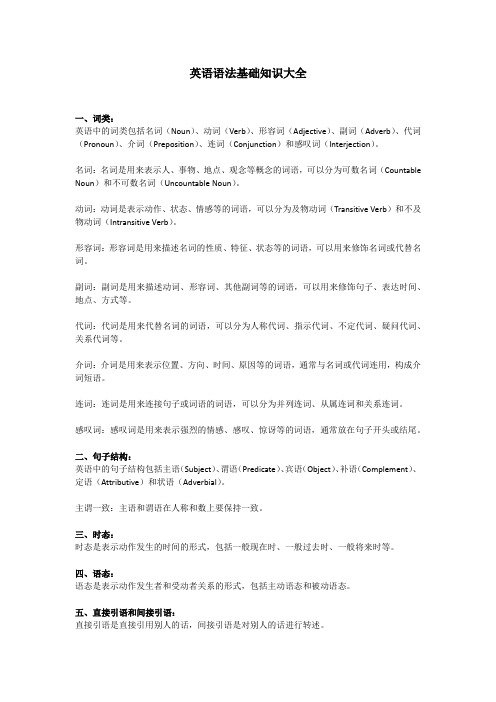
英语语法基础知识大全一、词类:英语中的词类包括名词(Noun)、动词(Verb)、形容词(Adjective)、副词(Adverb)、代词(Pronoun)、介词(Preposition)、连词(Conjunction)和感叹词(Interjection)。
名词:名词是用来表示人、事物、地点、观念等概念的词语,可以分为可数名词(Countable Noun)和不可数名词(Uncountable Noun)。
动词:动词是表示动作、状态、情感等的词语,可以分为及物动词(Transitive Verb)和不及物动词(Intransitive Verb)。
形容词:形容词是用来描述名词的性质、特征、状态等的词语,可以用来修饰名词或代替名词。
副词:副词是用来描述动词、形容词、其他副词等的词语,可以用来修饰句子、表达时间、地点、方式等。
代词:代词是用来代替名词的词语,可以分为人称代词、指示代词、不定代词、疑问代词、关系代词等。
介词:介词是用来表示位置、方向、时间、原因等的词语,通常与名词或代词连用,构成介词短语。
连词:连词是用来连接句子或词语的词语,可以分为并列连词、从属连词和关系连词。
感叹词:感叹词是用来表示强烈的情感、感叹、惊讶等的词语,通常放在句子开头或结尾。
二、句子结构:英语中的句子结构包括主语(Subject)、谓语(Predicate)、宾语(Object)、补语(Complement)、定语(Attributive)和状语(Adverbial)。
主谓一致:主语和谓语在人称和数上要保持一致。
三、时态:时态是表示动作发生的时间的形式,包括一般现在时、一般过去时、一般将来时等。
四、语态:语态是表示动作发生者和受动者关系的形式,包括主动语态和被动语态。
五、直接引语和间接引语:直接引语是直接引用别人的话,间接引语是对别人的话进行转述。
六、复合句:由一个主句和一个或多个从句组成的句子称为复合句。
从句可以分为名词性从句、形容词性从句和副词性从句。
《英语语法基础知识大全_(全文)》.doc

英语语法基础知识第1课:1、be (是)动诃的用法:am接I; is接第三人称单数,即除you、I夕卜;are接表示多个人或事物,即复数。
(我是am,你是are, is连接它、她、他,单数is,复数are)。
2、not 是表示否定的词:不是的表达,am not, is not (isn' t), are not (£iren, t)a3、“一•个”和“几个”的问题:“一个”是a+名词;“多个”是名词后面加s。
4、以无音开头(如O、E等),前面的冠词用an。
第2课:1、及物动词与不及物动词的区别:及物动词后面接宾语;而不及物动词后面不接宾语。
女|[ I like ice cream , It hurts o2、主语是he、she、i(和单数名词时,动词要发生第三人称的变化,即加s。
3、否定的用法:在动词之询加do not或does not。
I、You和复数名词做主语吋,否定就用do not;凡是单数名称和he、she、it做主语,否定就用does note第3课1 > my (我的)、your (你的)、his (他的)、her (她的)、their (他们的)、our (我们的)、its (它的)+ 名诃,如my love, your love 。
2、..................................... 名词所有格形式为:名词+' S,表示“的”,如Sophie' s world, children? sDay,Japan' s tomorrow o 3、.................................................. 用名词+of+名词,一般用在无生命的名词上,表示“...................................... 的’’,The sound of music(音乐之声)。
英语语法基础知识大全基本语法
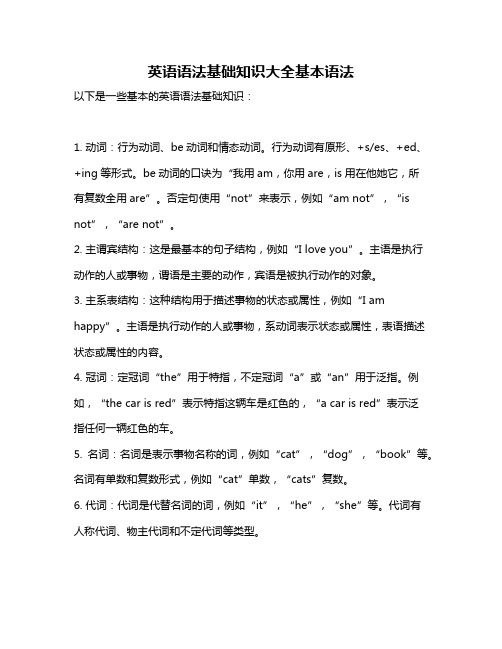
英语语法基础知识大全基本语法以下是一些基本的英语语法基础知识:1. 动词:行为动词、be动词和情态动词。
行为动词有原形、+s/es、+ed、+ing等形式。
be动词的口诀为“我用am,你用are,is用在他她它,所有复数全用are”。
否定句使用“not”来表示,例如“am not”,“is not”,“are not”。
2. 主谓宾结构:这是最基本的句子结构,例如“I love you”。
主语是执行动作的人或事物,谓语是主要的动作,宾语是被执行动作的对象。
3. 主系表结构:这种结构用于描述事物的状态或属性,例如“I am happy”。
主语是执行动作的人或事物,系动词表示状态或属性,表语描述状态或属性的内容。
4. 冠词:定冠词“the”用于特指,不定冠词“a”或“an”用于泛指。
例如,“the car is red”表示特指这辆车是红色的,“a car is red”表示泛指任何一辆红色的车。
5. 名词:名词是表示事物名称的词,例如“cat”,“dog”,“book”等。
名词有单数和复数形式,例如“cat”单数,“cats”复数。
6. 代词:代词是代替名词的词,例如“it”,“he”,“she”等。
代词有人称代词、物主代词和不定代词等类型。
7. 形容词:形容词是描述名词或代词性质或特征的词,例如“big”,“beautiful”,“happy”等。
形容词有原级、比较级和最高级形式。
8. 副词:副词是描述动词、形容词或其他副词的词,例如“fast”,“slowly”,“happily”等。
副词有地点副词、时间副词、方式副词等类型。
9. 介词:介词用于表示名词或代词与动词之间的关系,例如“in”,“on”,“under”等。
介词后面通常跟名词或代词。
10. 连词:连词用于连接两个或多个句子或分句,例如“and”,“but”,“or”等。
连词有并列连词和从属连词等类型。
以上是一些基本的英语语法基础知识,了解这些基础知识有助于更好地理解和运用英语语言。
英语语法基础知识有哪些
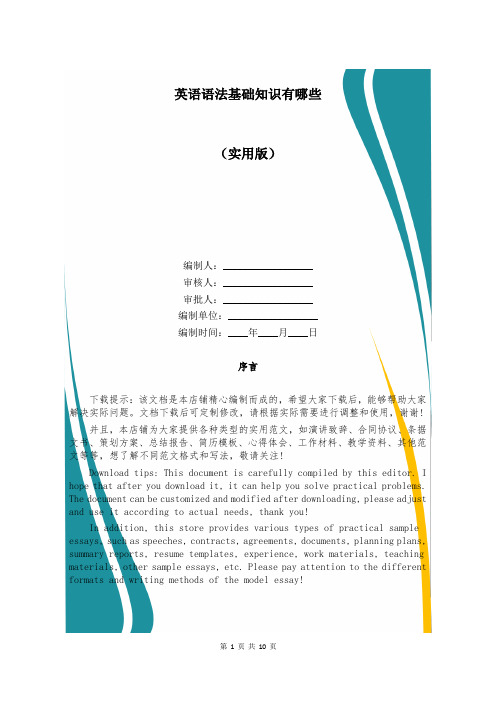
英语语法基础知识有哪些(实用版)编制人:__________________审核人:__________________审批人:__________________编制单位:__________________编制时间:____年____月____日序言下载提示:该文档是本店铺精心编制而成的,希望大家下载后,能够帮助大家解决实际问题。
文档下载后可定制修改,请根据实际需要进行调整和使用,谢谢!并且,本店铺为大家提供各种类型的实用范文,如演讲致辞、合同协议、条据文书、策划方案、总结报告、简历模板、心得体会、工作材料、教学资料、其他范文等等,想了解不同范文格式和写法,敬请关注!Download tips: This document is carefully compiled by this editor. I hope that after you download it, it can help you solve practical problems. The document can be customized and modified after downloading, please adjust and use it according to actual needs, thank you!In addition, this store provides various types of practical sample essays, such as speeches, contracts, agreements, documents, planning plans, summary reports, resume templates, experience, work materials, teaching materials, other sample essays, etc. Please pay attention to the different formats and writing methods of the model essay!英语语法基础知识有哪些英语语法基础知识点有哪些想要学好英语的话,可以尝试去多听英文歌曲,多看英文电影、书籍等。
英语语法基础知识大全可打印
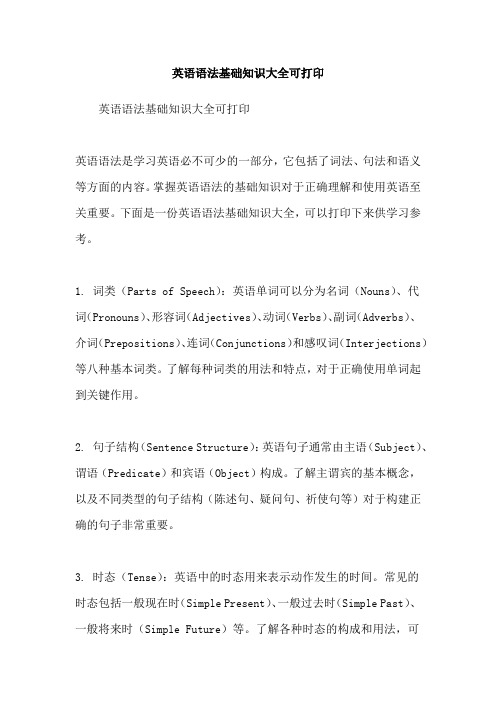
英语语法基础知识大全可打印英语语法基础知识大全可打印英语语法是学习英语必不可少的一部分,它包括了词法、句法和语义等方面的内容。
掌握英语语法的基础知识对于正确理解和使用英语至关重要。
下面是一份英语语法基础知识大全,可以打印下来供学习参考。
1. 词类(Parts of Speech):英语单词可以分为名词(Nouns)、代词(Pronouns)、形容词(Adjectives)、动词(Verbs)、副词(Adverbs)、介词(Prepositions)、连词(Conjunctions)和感叹词(Interjections)等八种基本词类。
了解每种词类的用法和特点,对于正确使用单词起到关键作用。
2. 句子结构(Sentence Structure):英语句子通常由主语(Subject)、谓语(Predicate)和宾语(Object)构成。
了解主谓宾的基本概念,以及不同类型的句子结构(陈述句、疑问句、祈使句等)对于构建正确的句子非常重要。
3. 时态(Tense):英语中的时态用来表示动作发生的时间。
常见的时态包括一般现在时(Simple Present)、一般过去时(Simple Past)、一般将来时(Simple Future)等。
了解各种时态的构成和用法,可以帮助准确描述动作发生的时间。
4. 语态(Voice):英语中的语态用来表示动作的主语与宾语之间的关系。
常见的语态包括主动语态(Active Voice)和被动语态(Passive Voice)。
了解不同语态的构成和用法,可以帮助准确描述动作的执行者和受动者。
5. 主谓一致(Subject-Verb Agreement):英语中的主语和谓语动词在人称和数方面需要保持一致。
了解主谓一致的规则和常见的例外情况,可以有效避免主谓不一致的错误。
6. 修饰语的位置(Placement of Modifiers):形容词和副词在句子中起到修饰名词或动词的作用。
汉语语法基础知识-PPT

语法特点:1、连接分句得连词,常成对使用,或跟某些 词 配合使用。 如,尚且…何况… 只有…才… 2、连词只有关联作用,没有修饰作用,不作句子成分。
请把在这段文字中得连词找出来。
作为语录体散文,《论语》虽 然没有详尽、具体得描写,但从 孔子与其它人得对话中,却生动 地显现出了孔子及其一些弟子得 形象。
单句得句子结构
口诀: 主谓宾、定状补,主干枝叶分清楚。 定语必居主宾前,谓前为状谓后补。 状语有时位主前,逗号分开心有数。
例如:(产生了深远影响 得) 这件事 对[于一般见异思
定
主
迁得人],对[ 于一般鄙薄技术工作以为不足道、以为
状
无出路得人,]就是( 一个极好得值得反省) 得事件。
谓
定
宾
句子就是由词或短语构成得语言单位,能表达一 个相对完整得意思,能完成一次简单得交际任务,在 语音上有一定得语调,表示陈述、疑问、祈使、感 叹得语气,在书面上用句号、问号、感叹号表示出 来。
语法功能:可以代替名、动、形 、数与副,还可 代替短语与句子。可做得句子成分同所代得词。
请请把把下下面面文文字字中中得得代代词词找找出出来来。。
““就就是是谁谁??为为什什么么偏偏偏偏就就是是我我得得父父 亲亲??””多多少少次次我我问问自自己己。。
当当我我为为这这个个世世界界得得黑黑暗暗与与痛痛苦苦发发出第 一出声第哭一喊声时哭,父喊亲时就,父像亲山就那像边山每那一边天每升天腾得 那升轮腾红得红那亮轮亮红得红太亮阳亮,点得亮太了阳我,点得亮整了个我世界。 就得在整那个一世刻界,父。亲就把在自那己一铸刻成,父了亲我把永自恒己得向 往铸。成了我永恒得向往。
虚词,没有实在意义得词。包括:
1、副词,经常用在动词、形容词前面,表示程度、范围、时 间、否定、语气、频率等。
英语语法基础知识总结
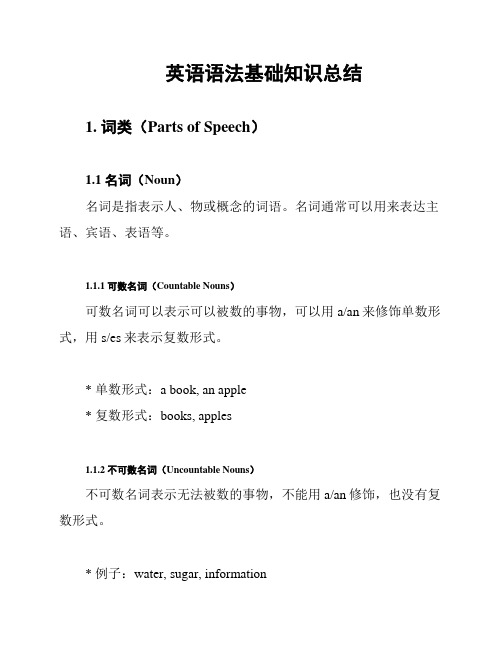
英语语法基础知识总结1. 词类(Parts of Speech)1.1 名词(Noun)名词是指表示人、物或概念的词语。
名词通常可以用来表达主语、宾语、表语等。
1.1.1 可数名词(Countable Nouns)可数名词可以表示可以被数的事物,可以用a/an来修饰单数形式,用s/es来表示复数形式。
* 单数形式:a book, an apple* 复数形式:books, apples1.1.2 不可数名词(Uncountable Nouns)不可数名词表示无法被数的事物,不能用a/an修饰,也没有复数形式。
* 例子:water, sugar, information1.2 动词(Verb)动词用以表示动作或状态。
动词可以分为及物动词和不及物动词。
1.2.1 及物动词(Transitive Verbs)及物动词需要接受一个宾语,来完成其动作的意义。
* 例子:I read a book.(我读一本书。
)1.2.2 不及物动词(Intransitive Verbs)不及物动词不需要接受宾语,它的意义可以独立完成。
* 例子:She sleeps.(她睡觉。
)2. 时态(Tenses)2.1 现在时态(Present Tense)现在时态表示目前正在进行或经常发生的动作。
2.1.1 现在进行时(Present Continuous)现在进行时表示正在进行的动作,使用"am/is/are + 动词-ing"形式构成。
* 例子:I am studying.(我正在研究。
)2.2 过去时态(Past Tense)过去时态表示过去发生的动作。
2.2.1 一般过去时(Simple Past)一般过去时表示在过去某个时间发生的动作,通常用动词的过去式形式表达。
* 例子:She played piano yesterday.(她昨天弹了钢琴。
)2.2.2 过去进行时(Past Continuous)过去进行时表示过去某一时间正在进行的动作,使用"was/were + 动词-ing"形式构成。
英语语法基础知识要点

英语语法基础知识要点英语语法基础知识要点大全语法是英语最重要的组成部分,我们在学习英语时,注意英语语法中的不规则现象,不断积累语法知识。
下面是店铺为大家整理的英语语法基础知识归纳,希望对大家有用!英语语法基础知识要点1主从复合句一、概念:主从复合句由一个主句和一个或一个以上的从句构成。
主句为句子的主体,从句只用作句子的一个次要成分,不能独立成为一个句子。
从句通常由关联词引导,并由关联词将从句和主句联系在一起。
(爷爷奶奶们很爱孩子,同时对他们也严格要求。
)(看起来会议没完没了。
)(快点, 要不然就来不及了。
)(不管我用什么方法煮鸡蛋,小孩还是不肯吃。
)二、分类:从句按其在复合句中的作用,分为主语从句、表语从句、宾语从句、定语从句和状语从句等。
三、各从句在句子中的位置以及用法:1、表语从句:在句子中作连系动词的表语的从句,它位于主句中的系动词之后。
例如:That is why he did not come to school yesterday.It is because you are so clever.2、宾语从句:在句子中作及物动词或介词的宾语。
①基本形式:(主句+)连词+从句主语+从句谓语+... ②关于宾语从句连词的选择:若从句来源于一个陈述句,那么,连词用that,在口语中that可以省略; 若从句来源于一个一般疑问句,连词则用if 或whether;若从句来源于一个特殊疑问句,则连词就是疑问词(如what,who,where,when等) 例如:They believe that the computerwill finally take the place of human beings.(他们相信计算机终将代替人类。
) (从句本来就是陈述句)I wonder whether I should say something for him to the headmaster.(我不知道是不是该为他在校长跟前说点什么。
英语基础语法知识总结大全
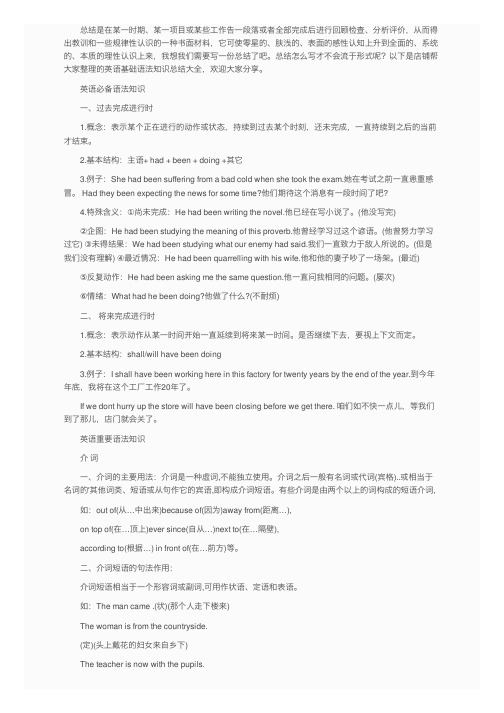
总结是在某⼀时期、某⼀项⽬或某些⼯作告⼀段落或者全部完成后进⾏回顾检查、分析评价,从⽽得出教训和⼀些规律性认识的⼀种书⾯材料,它可使零星的、肤浅的、表⾯的感性认知上升到全⾯的、系统的、本质的理性认识上来,我想我们需要写⼀份总结了吧。
总结怎么写才不会流于形式呢?以下是店铺帮⼤家整理的英语基础语法知识总结⼤全,欢迎⼤家分享。
英语必备语法知识 ⼀、过去完成进⾏时 1.概念:表⽰某个正在进⾏的动作或状态,持续到过去某个时刻,还未完成,⼀直持续到之后的当前才结束。
2.基本结构:主语+ had + been + doing +其它 3.例⼦:She had been suffering from a bad cold when she took the exam.她在考试之前⼀直患重感冒。
Had they been expecting the news for some time?他们期待这个消息有⼀段时间了吧? 4.特殊含义:①尚未完成:He had been writing the novel.他已经在写⼩说了。
(他没写完) ②企图:He had been studying the meaning of this proverb.他曾经学习过这个谚语。
(他曾努⼒学习过它) ③未得结果:We had been studying what our enemy had said.我们⼀直致⼒于敌⼈所说的。
(但是我们没有理解) ④最近情况:He had been quarrelling with his wife.他和他的妻⼦吵了⼀场架。
(最近) ⑤反复动作:He had been asking me the same question.他⼀直问我相同的问题。
(屡次) ⑥情绪:What had he been doing?他做了什么?(不耐烦) ⼆、将来完成进⾏时 1.概念:表⽰动作从某⼀时间开始⼀直延续到将来某⼀时间。
- 1、下载文档前请自行甄别文档内容的完整性,平台不提供额外的编辑、内容补充、找答案等附加服务。
- 2、"仅部分预览"的文档,不可在线预览部分如存在完整性等问题,可反馈申请退款(可完整预览的文档不适用该条件!)。
- 3、如文档侵犯您的权益,请联系客服反馈,我们会尽快为您处理(人工客服工作时间:9:00-18:30)。
• I forgot your telephone number. • Don’t waste water. • May I use your computer?
• (1) 及物动词 (vt.)必须带宾语,可用于被动 语态
• B.跟双宾语的及物动词
• 可以同时跟两个宾语的及物动词叫双宾语 动词。双宾语中的一个宾语指人,称为间 接宾语,一个宾语指物,称为直接宾语。 间接宾语一般位于直接宾语之前,也可位 于其后,但此时在间接宾语的前面需加介 词to或for。
• We are Chinese.(我们是中国人。)
• 2、表示“感觉”的词,如look(看起来),feel(觉得, 摸起来),smell(闻起来),sound(听起来),taste( 尝起来)等,例如:
• She looked tired.(她看一去很疲劳。)
• I feel ill.(我觉得不舒服。)
• 春天来了,天气变得暖和些了,白天也变得较长些了。 • He grew old. 他老了。
• 难点解释 • 注意区别以下一些动词的用法,它们既可以作为行为动词
,又可以作为连系动词。 • 1、look看;看起来 • He is looking at the picture. • (他正在看这图片。)行为动词
• பைடு நூலகம்hen did it happen?
• He was shivering all over.
• 常见的不及物动词:
• ache, appear, arise, belong, collapse, come, cough, crawl, creep, cry, die, dine, disappear, drift, exist, fall, flow, glide, go, happen, hesitate, itch, kneel, laugh, lie, live, occur, pause, remain, rise, sit, soar, sob, swim, travel, vanish, weep
• I will lend you my computer.
• We owed him 100 dollars.
• Hand me the timetable.
I will lend my computer to you.
• We owed 100 dollars to him.
• Hand the timetable to me. • 常见的动词:
基础语法知识
Verb
• I. 定义:表示动作状态的词叫动词。
• 2. 种类:
•
•
实义动词 (Notional Verb)
•
系动词 (Link Verb)
•
助动词 (Auxiliary Verb)
•
情态动词 (Modal Verb)
• (1) 及物动词 (vt.)必须带宾语,可用于被动语态 • A. 跟单宾语的及物动词 • 只跟一个宾语的动词称为单宾语动词。 • 常见的单宾语动词主要有: • achieve, admire, affect, afford, avoid, blame, build, buy, carry, • catch, claim, commit, complete, concern, control, convince, • correct, cover, create, cut, damage, demand, describe, design, • desire, destroy, discover, discuss, display, dread, enjoy, equal, • exchange, expect, experience, express, favor, fear, free, get, • give, grant, guard, handle, hate, lack, like, list, love, lower, • maintain, make, mean, mention, plant, prefer, prevent, • produce, pronounce, protect, provide, raise, receive, • recommend, record, release, remove, respect, reveal, risk, • shock, spot, support, tease, test, threaten, trust, upset, use, • value, want, waste, welcome, etc.
• (春天来临,树叶变绿。)
• The earth rurns around the sun.
• (地球绕着太阳转。)
• 这第二句句子中的turn是行为动词,意为“转动”。无法以is 替换。
• (三)助动词 这类词本身无词义,不能单独作谓语,只能与主要动词一起 构成谓语,表示不同的时态、语态、表示句子的否定和疑问 ,例如:
• Did he have any milk and bread for his breakfast ? • (他早餐喝牛奶、吃面包吗?) • 句中的did是助动词,既表示一般过去时,又和动词have一起
构成疑问。
• (四)情态动词 情态动词表示说话人对某一动作或状态的态度,认为“能够 ”、“可能、“应当”、“必要”等,与中文中的能愿动词 比较接近,但本身词义不完全。情态动词的特点有:
• It looks beautiful. • (它看上去很美丽。)连系动词 • 2、fell摸;感觉 • 1)I felt someone touch my arm. • (我感到有人碰我的手臂。)行为动词
• Are you felling better today than before? • (你今天比以前感到好些了吗?)连系动词
• 很多动词既可以用作及物动词,也可以 用 作不及物动词, 但是有时意思不同
不及物动词与介词搭配:
amount to, appeal to, associate with, believe in, belong to, care for, complain of, consist of, contribute to, depend on, emerge from, feed on, hope for, insist on, lead to, learn of, listen to, long for, object to, refer to, relate to, rely on, resort to, result in, suffer from, think of, wait for, etc.
• (二)连系动词
连系动词是表示主语“是什么”或“怎么
样”的词,它虽有词义,但不完整,所以
不能单独作谓语,必须跟表语一起构成合 成谓语,例如:
We are in Grade Two this year.(今年我们在 两年级。)are,是 are 这个词的词义“是”在句子中常常不译 出。
• 连系动词可具体分为三类:
• • C. 跟复合宾语的及物动词 • 在宾语中有些动词只跟一个宾语意义不完
整,宾语后必须再加上一个 成分(宾语补 足语),其意义才完整。
• Keep the window open. • 让窗户开着。
• The noise almost drove me mad. • 噪音几乎使我发疯。
• (2) 不及物动词 (vi.)不接宾语,不可用于被 动语态
• 1) 各个情态动词自身有一定的词义;
• 2) 情态动词不能单独作谓语,必须和实意动词的原形连用;
• award, bring, deal, forward, give, grant, band, lease, leave, lend, loan, mail offer, owe, pass, pay, play, post, read, rent, repay, sell, send, serve, show, sing, take, teach, tell, write, etc.
out. • (春天来了,树叶变经绿了,花儿开了。)连系动词
• 上述句子中的动词如grow、get、turn等,既可以作连系动词 ,又可以作行为动词。如何来辨别它们呢?有一个最简便的 方法,即用连系动词be替换句子中的这些动词,句子仍然成 立就是连系动词;反之,不能替换的,就是行为动词。例如 :
• The trees turn/are green when spring comes.
• Cotton feels soft.(棉花摸起来很软。)
• The story sounds interesting. • (这个故事听起来很有趣。)
• The flowers smell sweet. • (这些花闻起来很香。)
• The mixture tasted horrible. • (这药水太难喝了。) • 3、表示“变”、“变成”的意思的词,如become, get,
• 6、get得到,获得;变 • There are some bananas on the table. Each of you can get one. • (桌上有些香蕉,你们每个人可以拿一个。)行为动词 • 7、grow生长,种植;变 • Do you grow rice in your country? • (你们的国家种水稻吗?)行为动词 • It’s too late. It’s growing dark. • (太迟了,天渐渐变暗了。)连系动词 • 8、turn转动,翻动,使变得;变 • The earth turns around the sun. • (地球绕着太阳转。)行为动词 • When spring comes, the trees turn green and the flowers come
